This is an explanatory writeup of one of my Original Characters (OCs). Nothing here is necessarily related to a meaningful fiction you should recognise and is shared because I think my OCs are cool and it’s cool to talk about OCs you make.
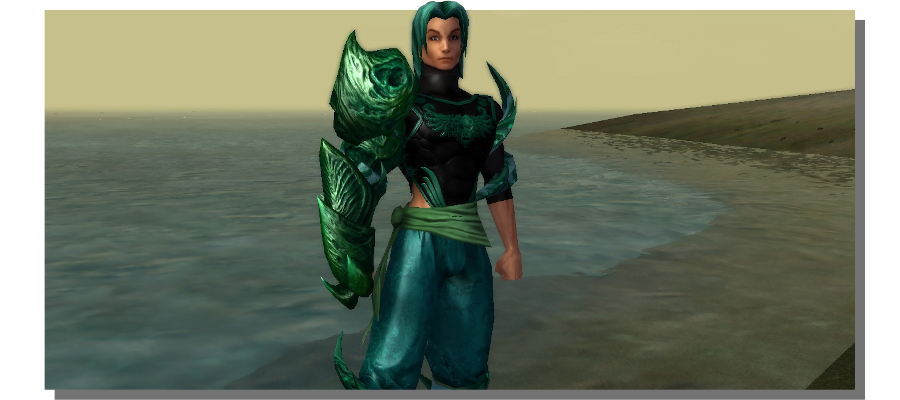
“You do not want me down there! You want me up here!”
Hamilton, aka TIDEWARD, the SCION OF THE SUNKEN CITY, is a Prince of a deep-ocean nation, of which he says little. A deep sea upbringing made him tough, and strong, and the royal regalia of his home grants him shapeshifting bio-tech armour. A stranger from a strange land, Hamilton has had to learn a lot about human society from things other than the stories his father told him of the surface world.
If you meet Tideward on the streets of Paragon City, you will probably remember him; he’s an absolutely towering young man, taller than most even by head and shoulders, dressed in garb that seems to indicate some kind of royal or imperial status that looks like swimwear. Maybe you’ve seen him transform, where that imperial armour clings to his body and looks like a scaly skin, changing his face to show coiling tentacles and bright, glowing eyes. He fights in a rolling mass of meat and eerie, unnatural howls, a dark green mist following wherever he goes. Obviously super-strong, he fights enemies, usually monsters and machines, with an enormous axe that looks like it’s made out of bone.
That axe is almost impossible to move if you’re not Tideward; not just because of its size, but like it has some resisting force that lets it push itself through space; it slowly grinds its way towards Tideward when they are separated, like a slow crawling shell across a beach. The armour is made up of scales that seemingly ‘flip over’ to reveal his skin underneath, but it breathes like skin, and the change to his face seems to be a shapeshift that somehow absorbs him into it. Whether man or monster, Tideward is known for being big and strong and fighting. He’s tough in the way of a deepest-sea creature, able to withstand the entire depth of the ocean, and breathes water all the way from the surface down.
Then there’s the question ‘can you talk to fish.’
And he can.
It doesn’t do much, but yes, he can talk to fish and understand the body language of fish. It’s not as exciting as people think. There’s a host of things beneath the ocean he knows – kingdoms and people who he can communicate with, and there’s also the strange way that he seems unaffected by some kinds of mental horrors. Adamastor and the Banished Pantheon run from him, and there’s some strange hierarchy at work with the things he demands of the world.
The boy is loud; he booms when he talks, and his voice seems to come from his whole chest. Naive, too, not completely stupid, but just very trusting, and prone to needing many common things explained to him that you’re used to in a day-to-day life. It helps, though, that there are some ideas that he connects to easily. For example, he sees encroaching armies like Arachnos, Nemesis and the Council as ‘Invaders,’ and he responds to them with categorical violence. Some groups, he understands as ‘enforcing Empire’, like Crey, the Circle of Thorns, and Malta, and his retaliation there is even more absolute.
The result is that while he seems to see the world in a very simple way, he is at least clearly very friendly and doesn’t spend his time asking questions in the face of easily rebuked evil.
There are of course other limits; for all that the space around him becomes populated with thrashing tentacles and clouds of toxic vapor, once outside of his reach, he’s extremely limited in what he can do to attack people. Mostly, he can just throw things. The other thing is that if the problem is immaterial, like a ghost, he doesn’t possess any special means to address them, and he’s a little too inclined to see people as equal agents, which can lead to odd encounters with supernatural forces. Like if you’re going to a location to fight a dreadful demon in its lair, if he meets it without someone more familiar with the genre of demon, he might just start a chat with it and ask to hear its side of things.
Basically, Tideward is a Himbo For Lovecraftian Monsterfuckers.
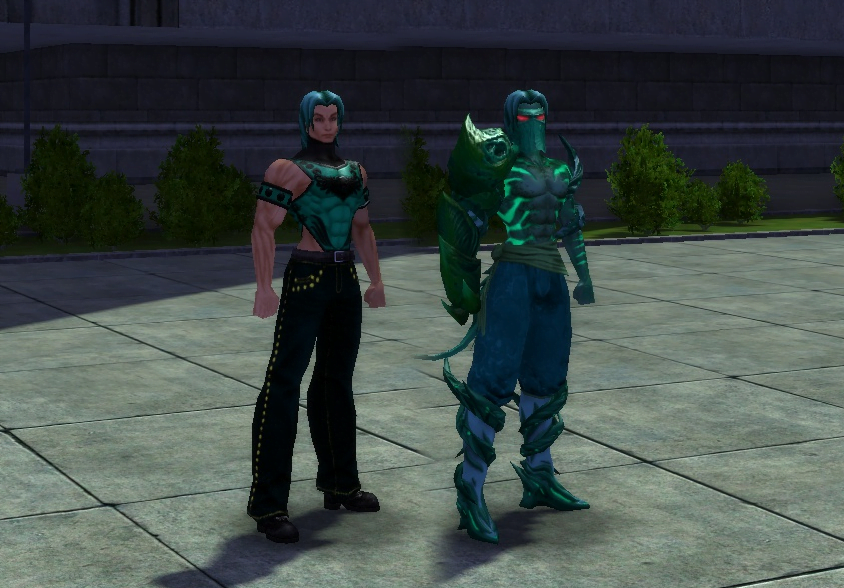
Mechanics
Woo, Bio Armour is hard to talk about. Oh and Titan Weapons is hard to talk about. This is going to be fine.
First up, Bio Armour gets to customise whether it’s in an offensive, defensive, or efficient mode. I go into offensive and tend to live there because I’m dumb and don’t like paying attention to it too much. I still keep all three buttons available to me like I’m gunna push them, because I’m also ambitiously dumb.
Furthermore, Bio Armour has three powers that rely on hitting enemies to have an effect, and not just like Dark Regeneration’s heal that Carcer has. In this case it’s Evolving Armour (which gives you an increase in resistances), DNA Siphon, which increases your regeneration and adds some other stuff to what you do, and Parasitic Aura, which adds to your recovery and temporary hit points. These three powers are great, and I click them when they’re available.
In Titan Weapons, there’s Defensive Sweep, which is your first-level attack, a big area attack, and it grants you a bonus to your melee and smashing defenses. Without it, Tideward has around 30% of each, with it, he’s soft-capped to both. This is obviously great and implies he wants to hit that attack every chance he can get, even when it’s only attacking one opponent.
What this means is that Tideward’s bullet-point list of powers is kinda complicated? Because he’s not like a lot of other builds where I can point to a sort of stable, ‘at rest’ mode, where all his powers are firing and permanently on and he’s able to just exist with those stats. Instead, these all come with asterisks.
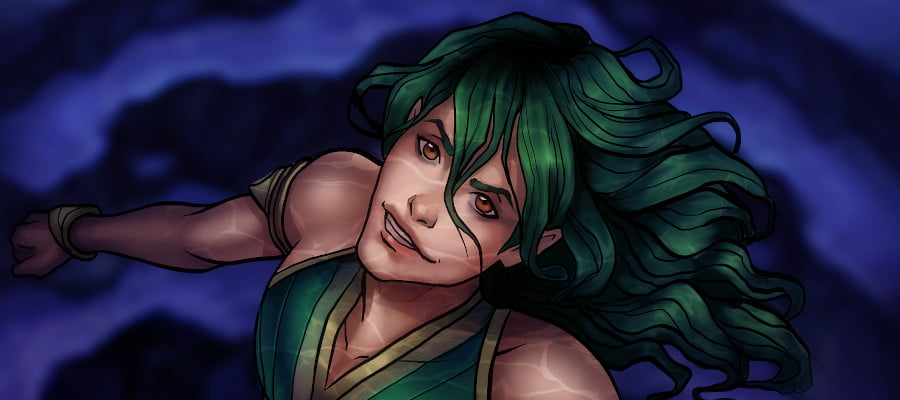
- Soft-capped defenses to smashing, fire, cold, energy, negative and melee*
- Capped resistance to smashing and lethal, with more than 50% resistance to fire and cold and 75% resistant to the spicy outlier Toxic
- Around 4,600 hit points (when he wants them) from a base of 1800, regenerating around 200 a second (so about 20 seconds to go from 1 hp to full health)
- Capped endurance recovery; in fact, he’s over the 500% cap by about 120%
- 20 second downtime on Hasten
- 56% global damage buff
If you’d like to look at it, here’s a data link.
This build differs from most of the other ones I’ve made because it’s not ‘mine’ properly. I’m familiar with Bio Armour and Titan Weapons, but mostly from playing Tideward, who seems to be really strong and doesn’t struggle with anything. I took some advice from the forums about ways to build him, when I had the money to spend on it, and, yeah, this build is really strong, and that’s really cool, but because I didn’t make all the choices in constructing it, I don’t have that same confidence I do in it. I’m sure it’s good, I just don’t feel like I can explain to you what makes it good.
This build isn’t final final, not really. There’s at least two places where I’m pretty sure I want to change the socketing — and a power I’m not even sure I want. He’s got Rune of Protection as a way to improve survivability under alpha strike situations, and that sounds desireable, but he’s already so tough as it is.
There’s a lot of socketing here that I think of as untidy, and I’m not sure how good he is when he exemplars down, and the whole build is really, really expensive, with Winter IOs, Archetype-Os and purples.
Since I like to entertain the idea that people read these articles and look at the builds for advice, here’s a stripped down version of the build, something that’s more affordable and approachable, even if it isn’t as tough and, isn’t as good in as many situations.
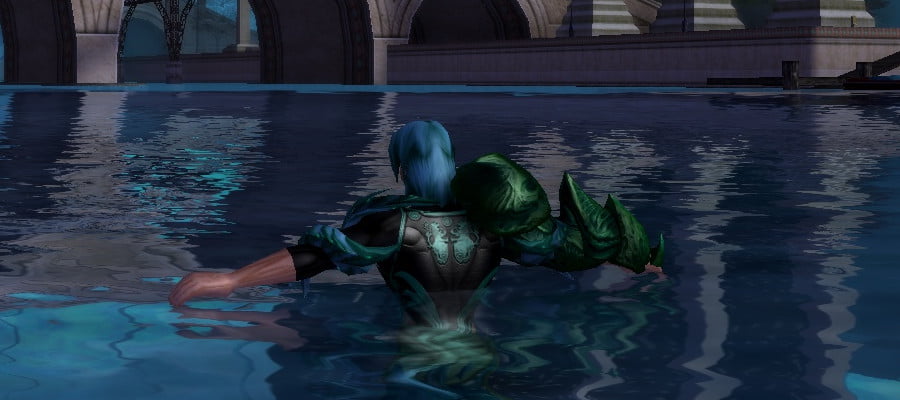
There’s more to him mechanically, though! Because Tideward is also hacking the rules for his size in game. If you open up any given costume file, they open with a segment that reads like this:
{
Scale 22
BoneScale -0.4829
ShoulderScale -0.03276
ChestScale -0.5769
WaistScale -0.6208That first stat, scale, represents the ‘height’ stat. By default the game only goes up so high – I think it’s like 24 – on male and huge bodies. But if you give it a much higher number (in this case, 36), your character is scaled up to a much greater size. And you might wonder ‘does this work on women?’
No.
Women can cheat the other end of the scale and become Very Smol, but that’s less of a thing I want in my character designs. Also, I wish it didn’t work that way – let me make the 49th a towering powerhouse, you cowards.
I’ve talked about this trick with Wolfbit, who uses it for one costume, but for Tideward it’s there for all of them. In his case, what this means is that I make a costume, customise how I want it to look, save it, then don’t commit to the change. I open the costume file, change the scale to 36, and then load the costume in the game, and commit to it without changing any sliders. Doing it this way lets you skip the game’s checking your size, and you get to keep it.
History
There are many layers to the history of the character of Tideward. In the simplest sense, he’s a character who I created on the bio armour beta of City of Heroes when it was live, and then that patch never made it to live. I’m pretty sure that’s the timeline, but I don’t have proof of it. Then we got Homecoming in 2019 and he was one of the first characters I made, who I was so excited to get to play.
As a character, he’s almost not been roleplayed; I brought him into Gen4 RP, and I loved the friendships he had there but when that group dissolved, everyone went their own directions. Oh well.
But that’s the history of the character as played. What about the history of the character, as a concept? His diegetic history?
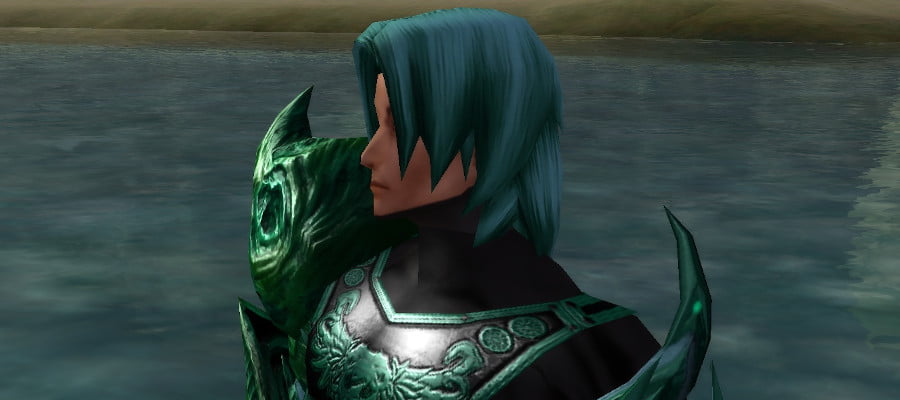
Here’s how it starts; when you encounter Tideward, in-setting, out of nowhere, you ask him something like ‘where are you from’ and he’ll say The Dead City E’ya’doen, Whose Walls Yet Slumber. Then he’ll go on to explain he’s the Prince of the city, and then, usually, he’ll get distracted by something like chicken dumplings. That’s how it tends to go.
And maybe you have a question or two, like the most obvious one being what’s that. Another common question is oh, like Atlantis? and another question again is why do you speak English?
Tideward hates Atlantis. It’s not a hate he derives in a general way either. It’s because in his setting, Atlantis is a bit like the British Empire; it’s a nation that spreads its influence to other deep-sea cities. In his context, most of the ‘cities’ of the deep grew there slowly and organically, and Atlantis’ offer of connecting them through transport networks is presented as a free choice. And it was for most cities — becoming part of Atlantis was a free choice made with no understanding of alternate consequences.
But for those city-states that did not accept becoming part of the Atlantean Empire, Atlantis would return, later, with an army, and ask again.
And then when refused, they would return with a larger army.
And they would not ask.
This was not known. It rarely happened, at least, to people who could remember it. Some places that are part of Atlantis have been part of it for so long that that colonial history was literally lost. The Empire spreads across much of the ocean, lines of city states, protected in shallower waters, avoiding the Deep Darks. There are cities in those Deep Darks — but the nature of the ocean is that the darker and deeper you go, the more dangerous it is, the less resources there are to go around. Cities in those spaces are rare. They are often around resources that let them survive down there, like sulfur vents or magical runes.
One such city is E’ya’doen.
And now in the story, the reader goes ‘oh, that’s why it’s called the Dead City.’
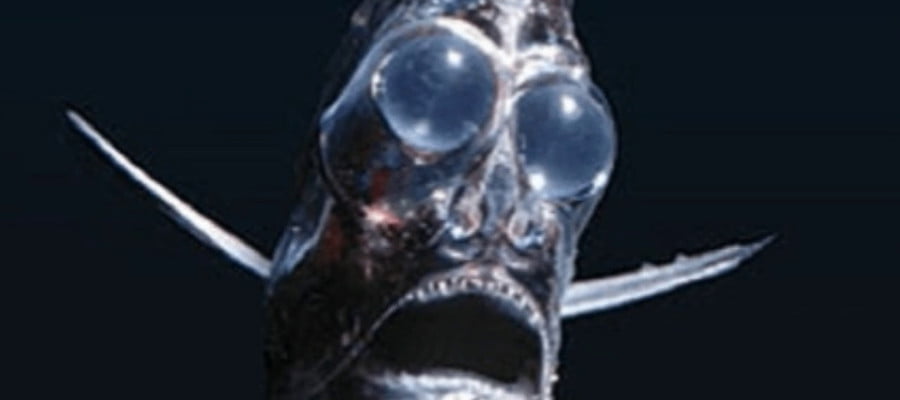
Nope!
The dead city of E’ya’doen was known as that well before it ever came into Atlantis’ notice. The people who live there look like hatchetfish, each about a hundred centimeters tall, with flat little feet out the bottom and hanging, noodly arms on their sides. While capable of swimming easily, they walk on their streets mostly, because walking is something that they culturally consider civilised.
The city is ruled by a King, chosen over a hundred and fifty years ago. He came from the great beyond, and he fulfilled a prophecy. A trader, who fell off a boat, and woke up in the city. Somehow, alive, and believing himself, his whole life to have been saved by the hatchetfish people. They told him he was their king, as per the prophecy tablets in their intricate, magically advanced city. There were towering rune-stones, with stories on them in glowing, bubbling fonts that they could read. They were awaiting the arrival of their king, and he would awake, and then they would be made whole.
The man was uncertain, but did what he could; kingship was thrust upon him so he did his best. He never once considered that he might have died on the way down to the city, and his ‘waking up’ able to breathe and speak the language was more miraculous than he thought. He ruled, he tried to make laws, he tried to replicate England and America as best he understood them with his limited understanding, and when he was done, he had a son.
Now, delicately, this was done with the use of a royal spawning bed; eggs were presented for him to fertilise, and he in his privacy, did so. Didn’t know if it’d work, but to his surprise, it did, and an egg hatched, and gave forth a son, who was… a lot like his dad, but not as much as he might fear. That man grew up to be Tideward’s father, and he was the last mad King of the Dead City.
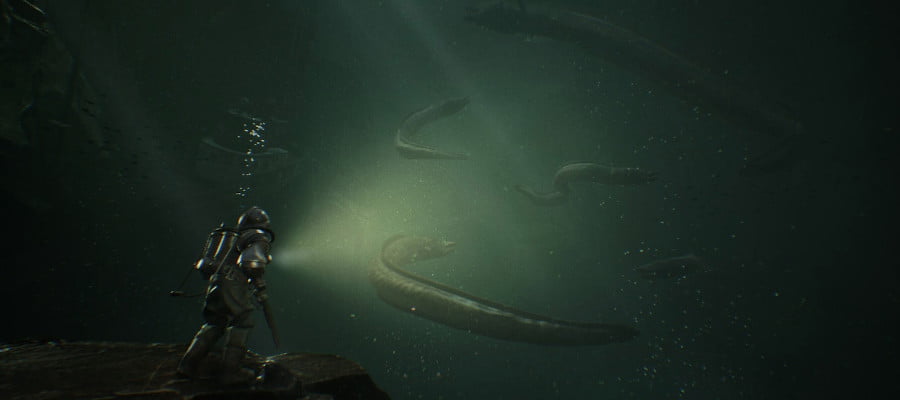
Atlantis came with their offer.
A good king, a smart king, would know how to negotiate. But Tideward’s father was not a good king, or a smart king. He was infuriated and sent the emissaries away. They returned, he rejected them. They returned, and war was to be joined.
And the mad king, enraged, activated ancient runes in the city, to activate ancient defenses that released strange, filmy, half-transluscent creatures from inside the walls and under the earth of the city. As they erupted out of the ground, their bodies swallowed up the people of the city, killing them and turning them into something else, something wrong.
Atlantis was driven off, but at the cost of all life in the City. Tideward, the son, had run to grab his father’s armour and fight off the invaders. And his mad father had seen this as an attempt to seize power, and attacked him, knocking him out for the duration of the battle. When Tideward awoke, he had the royal armour fused to his skin and a dead city, full of sleeping, transluscent outlines of feetless bodies, with humanoid torsos, each one the size of a bus, draped around his city, filling it up.
The city was dead.
There was nobody to crown him.
He would never be King, and he would always be a Prince.
So he made to leave, and fought through one of these dread guardians to do it, taking one of their ribs as a souveneir and as the weapon he would use, later, to fight with. And he swam to the surface world, to look for a life that was now, hopefully, going to feature something new.
It’s part of the naievete. Tideward grew up in a society catering to him that he didn’t actually like much, because all the privileges he had were for things he didn’t want. He could have been a conquering hero, claiming dark territory, but he didn’t want to hurt those who hadn’t invited it. He could have commanded a harem and indulged in hedonism, but the hatchetfish people weren’t appealing to him, leaving him convinced he was asexual (he has since come to the surface and found that, oh, no, he does have sexual attraction, but to people with feet and hands like him).
And there’s one last dangling note.
He was chosen to be the Prince of his people because his grandfather was King. And he was King, because the people were told that there was a king coming, from above the surface, the great beyond, and when he arrived, they would follow and obey him. But they didn’t understand there’s a difference between above the surface and outer space.
There is a cosmic horror that’s going to come for the remnants of that city, and it’s probably going to want Tideward to give back the armour.

A lot of this is about garden path narratives. I’m leading you to obvious conclusions, then changing what you find there at the end. It’s a deliberate, intentional storytelling method, which is meant to make sure you have consistent assumptions, to make sure you feel comfortable in a narrative space, then show you how that assumption twists.
I do this because it matters to me to be clear in expressing what I think it means to be Lovecraftian. At the heart of Lovecraft’s stories of distress and horror, there’s always this confident, comfortable baseline that has to contend with anxiety. Lovecraft, for all of his stress and sadness, lived a very privileged life, even if it wasn’t as safe and privileged as he wanted. Lovecraft sits in the seat of colonialism, a beneficiary of it, and much of the horror in his experience is about recognising the safety and privilege he has, and then realising it is not absolute.
In Tideward’s case I want to build in that same cultural space; he is a beneficiary of his grandfather’s colonial fantasy, and the greater colonial structure of the space monster that resulted in the Dreaming City. His armour was created for the purpose of colonialism, but his weapon is a rib torn out of an immense wound he inflicted in that colonising force. Sure, his homeland was destroyed, but also he had to know it should never have been there, and all of his vaunted privilege didn’t make him any better at protecting the people he ostensibly was there to serve.
Tideward has lost everything he has, and all he can do with that now is try and make things better by proxy, finding things like his experience and acting on them. Because what else can he do?
He can’t even mourn.
Officially, in City of Heroes, Atlantis doesn’t exist. It’s a narrative dead-end that gets referenced in one Task Force, as a throwaway line that the original lore bible left alone. It’s something that I’m pretty free to invent anything I want around.
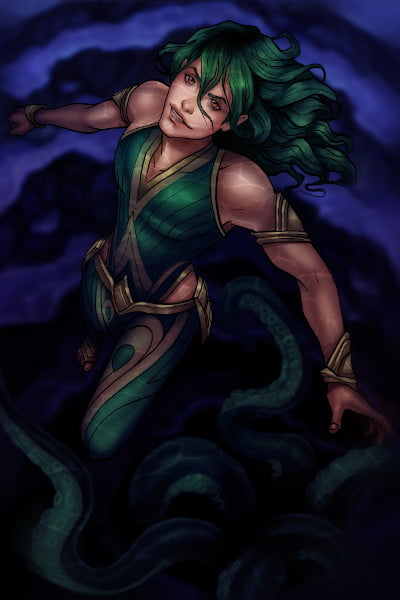
1 Trackback